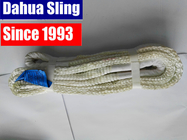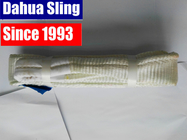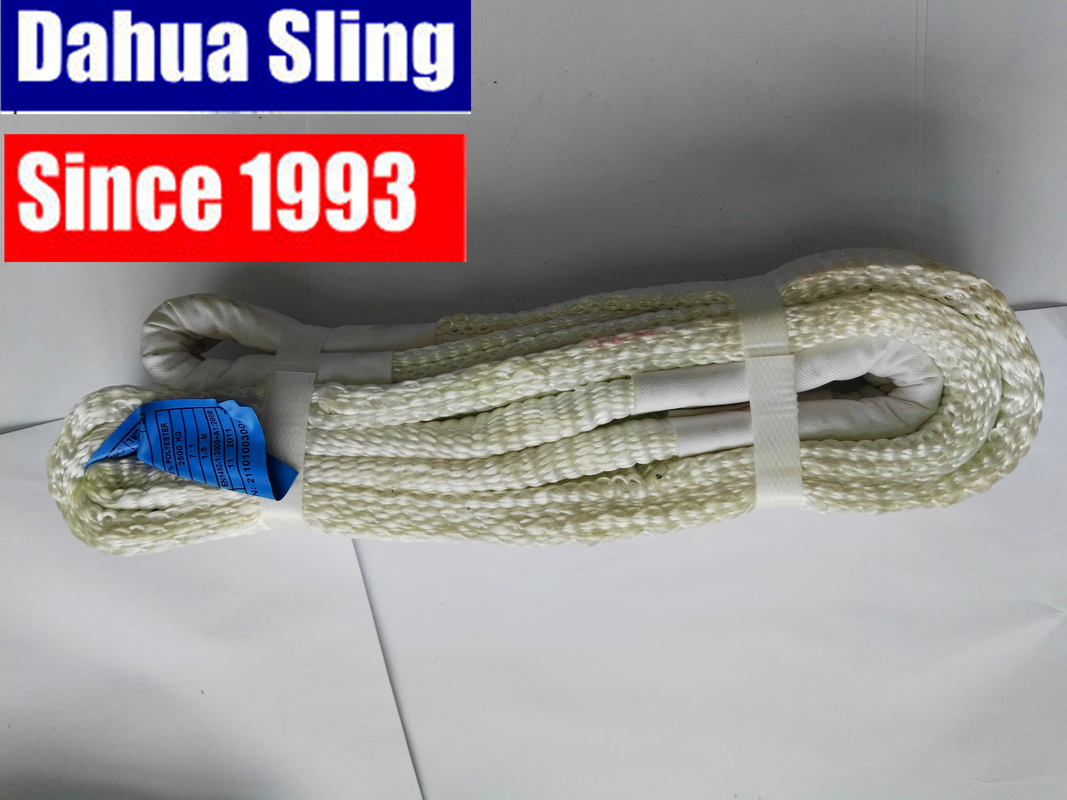CAUTIONS:
- Do not attempt to use sling above rated lifting capacity.
- When selecting a sling,it is very important to consider the angles at which the sling will be used.
- Slings are subject to cutting when ifting items with sharp egeds.In this case,always use protective sleeves
- Do not use a damaged sling,and se only if trained.
- Do not tie knots in sling webbing as strength is greatly reduced.
- Never drag a sling beneth from a load which is resting on it.
- Chemical active environments can affect the strength of slings
- Inspect slings weekly or more frequently depending on the sling use conditions.
- Always strore slings in a cool,dry and dark place to extend the working lift.
- Always read and understand the operating instructions before use.
- Failure to comply with this warning may result in serious load damageand death or injury.
When using flat woven webbing slings never:
• Attempt to shorten, knot or tie belt slings.
• Expose belt slings to direct heat or flames.
• Use belt slings at temperatures above 80°C or below 0°C without consulting the supplier.
• Expose belt slings to chemicals without consulting the supplier.
• Shock load belt slings.
• Use belt slings which are cut or which have loose or damaged stitching
Selecting the Correct Sling
Belt slings are available in a range of materials and sizes in single leg and endless sling forms. Select the slings to
be used and plan the lift taking the following into account:
Material
Polyester is resistant to moderate strength acids but is damaged by alkalis; polyamide (Nylon) is virtually immune to
alkalis but is damaged by acids; and polypropylene is little affected by acids or alkalis but is damaged by some
solvents, tars and paints.
Capacity
The sling must be both long enough and strong enough for the load and the slinging method. Apply the mode factor
for the slinging method. For use at temperatures exceeding 80°C or below 0°C refer to the suppliers instructions. If
the slings are used in multi-leg arrangement the angle formed between the legs should not be less than 30° or
greater than 90°. If abrasion, heat generated by friction or cutting from edges or corners are likely, select a sling
fitted with protective sleeves and/or use suitable packing.
Using Belt Slings Safely
Do not attempt lifting operations unless you understand the use of the equipment, the slinging procedures and the
mode factors to be applied. Do not use defective slings or accessories. Check the correct engagement with fittings
and appliances, ensure smooth radii are formed, do not twist or cross slings and do not overcrowd fittings. Position
the sling so that the load is uniformly spread over its width. Position the bight for a choke lift at the natural (120°)
angle to prevent friction being generated. Ensure that stitching is in the standing part of the sling away from hooks
and other fittings. Take the load steadily and avoid shock loads. Do not leave suspended loads unattended. In an
emergency cordon off the area.
In-service Inspection, Maintenance and Replacement
Inspect slings each day before use, looking for:
- Missing or unreadable ID tag
- Melted, charred or weld-splattered areas
- Acid or alkali burns
- Holes, tears, cuts, snags or embedded particles
- Broken or worn stitching
- Excessive abrasive wear or elongation
- Knots or brittle areas
- Broken, corroded, pitted distorted fittings
Do not use worn or damaged slings or attachments. Discard or repair them. Use damaged slings only after they are repaired, reconditioned, and proof tested by the sling manufacturer or a qualified person. Keep certificates of proof test.
Maintenance requirements are minimal. Belt slings may be cleaned with clear water. Remember weak chemical
solutions will become increasingly stronger by evaporation. Regularly inspect belt slings and, in the event of the
following defects, refer the sling to a Competent Person for thorough examination: illegible markings; damaged,
chaffed or cut webbing; damaged or loose stitching; heat damage; burns; chemical damage; solar degradation;
damaged or deformed end fittings.

 Your message must be between 20-3,000 characters!
Your message must be between 20-3,000 characters! Please check your E-mail!
Please check your E-mail!  Your message must be between 20-3,000 characters!
Your message must be between 20-3,000 characters! Please check your E-mail!
Please check your E-mail! 


